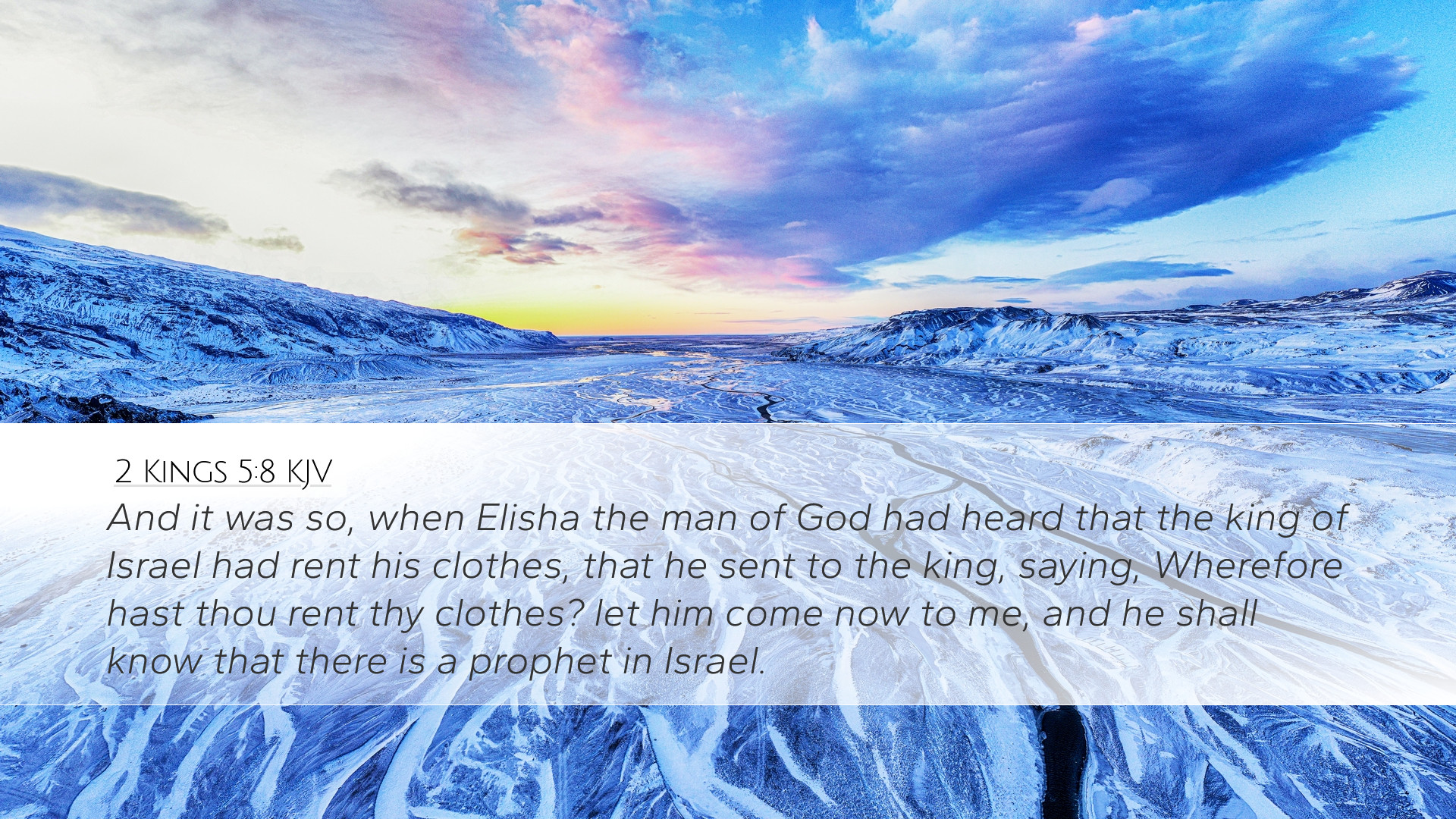Commentary on 2 Kings 5:8
2 Kings 5:8 states: "And it was so, when Elisha the man of God had heard that the king of Israel had rent his clothes, that he sent to the king, saying, Wherefore hast thou rent thy clothes? let him come now to me, and he shall know that there is a prophet in Israel."
Introduction
This verse unfolds significant theological insights that uncover the divine orchestration of events in the lives of individuals. The narrative centers around Naaman, a commander of the army of the king of Syria, who suffers from leprosy. His journey toward healing illustrates themes of faith, the sovereignty of God, and the role of prophetic ministry. In this commentary, insights are drawn from revered public domain sources, such as the works of Matthew Henry, Albert Barnes, and Adam Clarke, to provide a comprehensive understanding of this passage.
The Context of 2 Kings 5
The surrounding context of 2 Kings 5 shows a thread of divine intervention and human response. Elisha, the prophet, is called to intervene when the king of Israel expresses despair over Naaman's affliction. The situation sets the stage for a revelation of God's power and the need for humility and obedience.
The King’s Response
When the king of Israel hears of Naaman's request for healing, he tears his clothes, an ancient sign of mourning or distress. According to Matthew Henry, this act signifies the king's profound helplessness and fear that he is unable to meet Naaman's needs, expressing the deeper spiritual turmoil as he recognizes the limitations of his own authority to heal.
Albert Barnes notes that the tearing of clothes was indicative of frustration and hopelessness in the face of a seemingly impossible task, reflecting the tension that often accompanies a leader's burdens. It reveals a misunderstanding prevalent at that time about the nature of prophetic ministry and God's power through His prophets.
Elisha's Intervention
Elisha’s response to the king is significant. He seeks to redirect the situation back to faith in God. Elisha, characterized by humility and readiness, commands Naaman be sent to him. Adam Clarke explains that Elisha’s assurance to the king serves a dual purpose—restoring confidence in the power of God and showing the distinction between divine authority and human limitation.
Elisha’s inquiry, "Wherefore hast thou rent thy clothes?" prompts a vital reflection on despair versus faith. The question challenges the audience to consider their own reactions to difficult circumstances. It is a reminder that God often works in ways that, at first glance, may seem insufficient or too simple (e.g., needing only to wash in the Jordan River). The voice of the prophet seeks to elevate the focus from human methods to divine possibilities.
The Proclamation of God’s Power
By inviting Naaman to him, Elisha indicates that this is an opportunity not just for Naaman’s healing, but for a broader revelation of God’s power to both Israel and Syria. Matthew Henry suggests that the interaction underscores that God is sovereign over all nations, extending His grace and healing outside Israel, thus paving the way for a deeper understanding of the universality of God's mercy.
Albert Barnes affirms that God intended to demonstrate that the true source of healing is not in ritualistic or physical means but in the power and authority of the divine. The healing of Naaman serves to amplify the ministry of Elisha who acts as God's designated agent of restoration.
Faith and Obedience
Naaman's journey to Elisha is a testament to the interplay of faith and obedience. His initial reluctance to follow Elisha’s directive reflects a common human experience—a tendency to resist God’s means of grace. Adam Clarke highlights that Naaman's subsequent compliance exemplifies true faith, where the act of washing in the Jordan, though seemingly trivial, becomes a profound statement of obedience that culminates in his healing.
This reflects a larger spiritual principle; often, God's ways defy human logic and require a heart willing to submit and believe in spite of doubt. Those engaged in pastoral ministry can glean from this the vital importance of teaching congregations that genuine faith may lead them through pathways that initially appear implausible or beneath their dignity.
The Role of the Prophet
Elisha's role as a prophet illustrates a critical aspect of biblical leadership—caring response to individuals in need and facilitating their encounter with God. This challenges leaders today to embrace their call as conduits of grace. Elisha does not seek personal glory from Naaman's healing but aims to point others to God’s sovereign grace. Matthew Henry conveys that true prophetic ministry always leads people to know God better and to see Him as the true healer.
Conclusion
2 Kings 5:8 serves as a reminder of the profound implications of faith, obedience, and prophetic ministry. As leaders, scholars, and practitioners of the faith, understanding the dynamics of this passage can illuminate the ways God calls us to act in faith, urging us to respond to both personal and communal needs with the assurance that God is still at work in the world today.
Key Takeaways
- Theological insight: God's orchestration is evident in Naaman's story, highlighting His ability to transcend national borders and personal afflictions.
- Human limitations: The responses of the king and Naaman illuminate the tension between despair and faith, reminding us of our need for divine intervention.
- Prophetic role: Elisha exemplifies the essence of a God-centered ministry, focused on pointing others to God’s healing power.
- Faith in action: Naaman’s journey emphasizes how faith often requires humble obedience to God’s instruction, even when they seem inadequate.
Final Reflections
As students of the Scriptures, we find in this passage a microcosm of the Christian journey. It beckons reflection on our personal encounters with God, calls for obedience to His directives, and invites a deeper understanding of how His grace manifests in the everyday aspects of life. May we continue to search the scriptures for further revelations of His enduring and healing grace.


